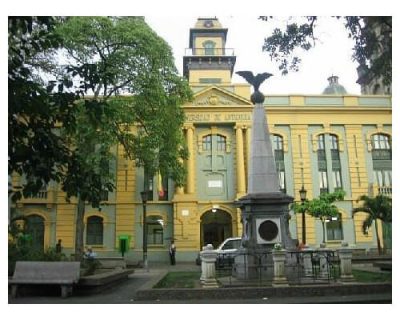
Dr Subhan Zein was interviewed by
Literaturuli Sakartvelo, a Georgian newspaper following his talk at Institute of Georgian Literature, Tbilisi State University. The newspaper is published in the Georgian language, and here is the translation:
– When did you become interested in Georgian literature?
I started to become interested in Georgian literature ever since I came across The Knight in the Panther’s Skin. This was around 2015 or 2016, when I started to rewrite the original version of the novel and redeveloping its concept.
– What made you interested in 12th-13th centuries Georgia?
I am interested in 12th-13th century Georgia because of its unique place in world’s civilisations. Georgia throughout the history was invaded by many countries, but it remained strong to keep its traditions; it was steadfast in preserving its culture, in maintaining its dignity. This is an admirable character of the nation, which truly impresses me.
– What do you see in Rustaveli’s poem that helps you develop your artistic and aesthetic concept?
I find the beauty of the poem to be a perfect precursor for the development of a character who lives 2-3 generations after Rustavelli. The fact that the protagonist has access to Rustavelli’s poem gives her a chance to learn from it and to be inspired by it.
– How do you see Rustaveli’s place in the history of world literature?
I think Rustavelli is totally underrated. He deserves more recognition, and he deserves to be known and studied more. The large emphasis of the world’s literature on the Western canon is unhealthy; it is very unidimensional. It only reflects the ignorance of the West of the greatness and beauty which Rustavelli transpires in his work.
– In whose translation did you get acquainted with the “Vepkhistqaosani”?
Marjorie Wardrop’s. It’s a beautiful, poignant translation
– First of all, what attracted you to “Vepkhistqaosani” as a literary work?
It’s beautiful language. Its coverage of different cultures is also very interesting.
– On 18 January 2023, when you had a presentation at the Institute of Georgian Literature, Tbilisi State University, you talked a lot about your upcoming novel, which is inspired by the ideas of Rustaveli. I wonder why you decided to “translate” the impressions received from reading “Vepkhistqaosani” into the language of fiction?
I must clarify that the novel is not solely inspired by Rustavelli. Indeed, his work is one of the inspirations, but there are other philosophers and poets whose works have been inspirational to me, hence deserving inclusion in the novel. They are Ibn Sina, Plato, Socrates, Ahmad al Ghazzali, Nizami Ganjavi, Al Masudi, Homer, Sappho, and many others. The inclusion of Rustavelli is apt to the emergence of the protagonist (i.e., Natela) who is also a Georgian. Natela is inspired by those philosophers and poets as much as she is inspired by Rustavelli.
– Who is the main character of your novel – Natela Bezhanishvili? Why Natela? Why Bezhanishvili? What does she express, what does she strive for, what does she want to achieve?
Why Natela? You would find the answer to the question once you get to read the part where Natela as a teenager becomes interested in world’s civilisations. 🙂

– And why Bezhanishvili?
I thought Natela’s father is Bezhan, so the name Bezhanishvili makes a sensible choice. I discussed the choice of “Natela” and “Bezan” with Professor Markia Jikia, an authority in Georgian onomastycs, and she approved of the idea.
– If it’s not a secret, tell me the title of your novel?
Please wait, as I am still considering it to be a book series instead, so there may be a few titles instead of a title.
– When are you likely to finish the novel?
Hopefully within 3 years.
– Recently, in December-January, you were in Georgia. As I know, you have seen the locations, where your novel takes place. What are your impressions? did the imaginary and the real coincide?
More or less, yes. I tried to build the connections between the imaginary and the real, but it was very difficult given than the city has changed so much from the 13th century which makes the the setting of the novel. Nevertheless, the spirit of the city must have remained the same. So it was useful to gain the spiritual inspirations from the city.
– When will we see you again in Georgia?
Hopefully sometime this year or the next.

Dr Subhan Zein accepted an invitation to attend the British Council’s Future of English Research Summit at Warwick University, England, 9-10 September 2022. He presented his paper ‘Recent trends in English as a subject in basic education in Asia’ in the Summit.

He also teamed up with a team of international researchers in the design of the Future of English research project, particularly in the development of online survey, analysis of coursebooks, as well as interviews and observations of teachers. The project is the largest international project on the future of English, involving no less than 40 scholars from around the world. Some of the scholars involved are Professor Fiona Copland (Warwick University, England), Professor Sue Garton (Aston University, England), and Professor Mario Lopez-Gopar (University of Oaxaca, Mexico).


On 27 September 2022, Dr Zein delivered a keynote talk at International Conference on Applied Linguistics, held in Universitas Pendidikan Indonesia (UPI), Bandung. His title of his talk was Superdiversity and translanguaging: Language beyond borders.

Following the completion of the Conference, Dr Zein was offered a Visiting Professorship position in Applied Linguistics at UPI. Rector of UPI, Prof. Dr. H. M. Solehuddin, M.Pd, M.A., signed a letter on 7 October 2022 to formalise Dr Zein’s professorship.
Dr Zein’s interest in world literature and his ongoing novel project have brought him in close acquaintance with Georgia’s foremost scholar in literature, Professor Maka Elbakidze.

Over the years, Professor Elbakidze has become Dr Zein’s ardent supporter in his project. Following the completion of the highly successful International Comparative Literature Association Conference where Dr Zein was a plenary speaker, Professor Elbakidze invited him to deliver a lecture at Ivane Javakhishvili Tbilisi State University. He accepted the invitation and deliver a lecture entitled ‘Shota Rustavelli and world’s literature: Pearls of wisdom on love typology’ on 18 January 2023.

After years of building research engagement with Asian scholars, Dr Zein attempted to forge new research networking with scholars in South America. His acquaintance with Professor Adriana Maria Gonzalez of Universidad de Antioquia, Medellin, Colombia, brought him closer to reach his aspiration.

He was then invited to deliver a lecture entitled ‘Language, languaging, translanguaging: Talks as social phenomena’ at Universidad de Antioquia. The talk, held on 3 March 2023, is a precursor for future engagement with other scholars in Colombia, particularly those involved in the UNESCO’s South American Project for Multilingualism and Language Diversity.

Dr Zein was invited by Professor Fernanda Liberari to deliver a lecture to postgraduate students at Pontifícia Universidade Católica de São Paulo (PUC-SP), São Paulo, Brazil. The lecture was held on 30 March 2023.

Speaking in front of an electrifying audience studying at a faculty where the internationally renowned Brazilian educator Paulo Freire used to teach, Dr Zein focused on ‘Translanguaging and multiliteracies as pedagogical liberation’.

Dr Zein has been invited by Universitas Kristen Satya Wacana, Salatiga, Central Java, Indonesia, to speak at a symposium on language education in Indonesia. The event is going to be held on 10 June 2023.

Scheduled to speak in front of undergraduate and postgraduate students, as well as school and university teachers, Dr Zein will present a talk entitled ‘Current trends in Applied Linguistics: Understanding translanguaging and superdiversity’.

Dr Zein has been invited to present his paper at the 21st AsiaTEFL Conference in Daejon, South Korea, 17-20 August 2023. His paper, Language ideologies and internationalisation of education in English as a subject in basic education in ASEAN, is based on his English as a subject in basic education in ASEAN research (Zein, 2022a, 2022b).

During the conference, he will also deliver a plenary speech on AsiaTEFL Book Series.
